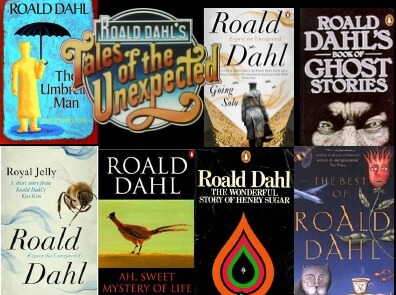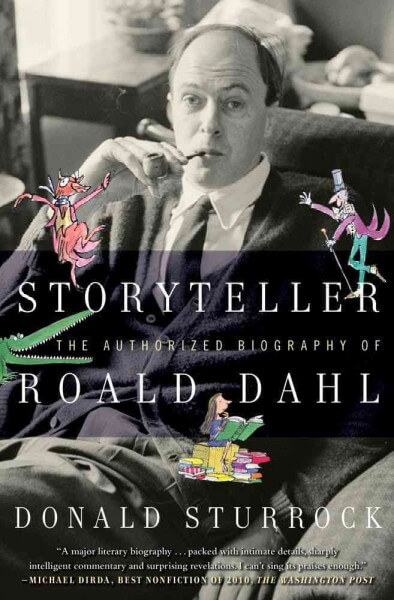Interview with Donald Sturrock: The Authorized Roald Dahl Biographer
Part II
(I spoke to Donald Sturrock, who penned Storyteller, which has been lauded by critics as the definitive biography of Roald Dahl. Though Dahl is most famous for his books for children, he wrote several short stories which have earned comparisons to Maugham, Saki, O’Henry and John Collier. In my conversation with Mr. Sturrock, we spoke about how Dahl’s creative and fertile imagination created so many tales which today stand as short story classics.)
AFG: What’s your favorite short story of his?
DS: I don’t know. I do think “Lamb to the Slaughter” is a beautiful kind of classic controlled-situation story; it’s very good. I also quite like some of the more completely misanthropic ones, the ones that are a bit more like a crazy satire, like “Pig,” which I think are to deal with the nasty side of human beings and the fact that if you don’t address that side and acknowledge that it’s there, you’ll end up suffering an absolutely terrible fate. That’s a pretty extreme one, but there’s also a really wonderful one he wrote at roughly the same time called “The Wish” about a boy treading on a carpet; the boy decides that something terrible is going to happen to him if he steps on any of the yellow bits in the complicated pattern and you know at the end that something terrible has happened to him.
AFG: That’s like a real type of a Saki story in a way.
DS: Yes.
AFG: Or it’s very Ellin. I think those were his two favorites. I think he loved John Collier, Stanley Ellin, and Saki.
DS: He liked Saki. He liked O. Henry, too.
AFG: Where was “The Wish” collected?
DS: It was collected in Someone Like You, and Penguin is reissuing the short stories with new titles in a new collected form. I don’t know if they’ve come out in the US yet; they’ve come out in the UK. I think the collected titles are “Greed,” “Lust,” “Deception,” Madness,”, and they’ve been re-collected. Some of the stories I think quite wrongly have been regarded as, if you like, teenage kids’ stories, such his story of “The Swan,” which is another really good one; that’s into “Revenge” or something, I think.
AFG: I need to buy these because I’m a big, big fan. What did he think of The Tales of Unexpected TV series? Did he like that or not?
 DS: I think he was conflicted about it. I think he enjoyed doing them to begin with. To begin with, they were mostly his stories, and he quite liked the hokum of introducing them. But then he may have felt that it was quite a nice little earner and he quite enjoyed doing it, but the standard of the tales kind of declined as one series followed another. I think those really helped, for me, from my side of it—I’m in my 50s; that was really how I first became aware of Roald Dahl and who he was, through his introducing those things. He would do them in a rather slightly sinister, self-consciously creepy way.
DS: I think he was conflicted about it. I think he enjoyed doing them to begin with. To begin with, they were mostly his stories, and he quite liked the hokum of introducing them. But then he may have felt that it was quite a nice little earner and he quite enjoyed doing it, but the standard of the tales kind of declined as one series followed another. I think those really helped, for me, from my side of it—I’m in my 50s; that was really how I first became aware of Roald Dahl and who he was, through his introducing those things. He would do them in a rather slightly sinister, self-consciously creepy way.
AFG: Yes, then he’d talk about how women would try to kill their husbands by chopping the whiskers off a tiger and putting it in their food. But speaking of misanthrope, there’s a whole perception that Roald Dahl is a misanthropic, difficult person. What are your memories of him?
DS: I was very lucky; I did not come across the difficult side of him. I think I caught him at a good point when I made my film with him and he liked the film so I was in his good books. And I saw him socially; I went down to stay for the weekend or I went down for dinner or for lunch. And if he wasn’t in a good mood, or he was in pain or not feeling very well, those things got cancelled, so I didn’t have to deal with him through that. But again, I think he was very conflicted. I think he could be, and was, extremely kind to quite a lot of people who were close to him or whose lives touched him, and he didn’t do that in the public eye. I believe that deep down he was pretty misanthropic. If you can get a copy of it, and you’re really interested, you should look at his novel Sometime Never that he wrote just after the war. It’s about the human race destroying itself. I think it’s the way he would like to have gone had his career as a novelist taken off the way he wanted it to. I think he wanted to be a satirist like Jonathan Swift, and write very scathingly; he had a black view about how adults could behave to each other, and that’s part of the reason why he liked children when they were innocent and young. I think he thought they had something beautiful and lovely about the way they saw the world, and the moment they became teenagers and became egotistical and complicated and deceitful and whatever, they became less and less interesting.
AFG: There are two favorites of mine; I wonder if you have any background on those: “Vengeance is Mine” and “Nunc Dimittis”?
DS: In terms of “Nunc Dimittis,” when Dahl was a young man, he was very interested in art and painting; he used to clean paintings. I remember he once told me that the very first painting he cleaned, which involves putting turpentine on a specific area to remove the varnish that has accumulated soot or whatever, but if you don’t do it right, it’s very easy to take the paint off, too; and he’d done just that. I think his brother or a cousin had given him a painting to try out, an
18th-century painting by an artist called Morland, and he’d done it so badly, he’d taken off such a lot of the paint that in the end he was forced to cover it up, to repaint the thing himself. Again, I don’t know whether to believe that; I kind of do because I just remember the way he told me, it was sort of believable. But again that detail, that there are things under the surface of the painting, that you could take off one layer and reveal something else, and of course, it could be somebody naked. I mean, that’s very, very fanciful.
AFG: What I just love is the way he’s poisoned at the end – I’m putting a spoiler but to me that was the best part. I loved it.
DS: I agree with you. I wish I could say something more interesting. I don’t know really about “Vengeance Is Mine” except that’s the one about going to punch the guy, isn’t it?
AFG: Yes. Punch the guy for $500; take a person and make him strip completely naked and then throw him in the middle of New York City or London during heavy traffic to embarrass him for £1000. I love that one; that was great.
DS: I would like to say I think he knew that there’s a sort of spirit of revenge that runs very deep in people and that probably if you did set up a company so that people could pass the taking of the revenge onto somebody else, it would probably do quite well.
 DONALD STURROCK is an award-winning TV film producer and a librettist who has been the artistic director of the Roald Dahl Foundation since 1992. He grew up in England and South America, attended Oxford University, and joined BBC Television’s Music and Arts Department in 1983. In 1995 Sturrock directed an acclaimed BBC television version of his own adaptation of Roald Dahl’s Little Red Riding Hood with Danny DeVito, Ian Holm, and Julie Walters. In 1998, at the Los Angeles Opera, Sturrock also directed the world premiere of Fantastic Mr. Fox, an opera based on Dahl’s book, adapted by Sturrock, and with designs by Gerald Scarfe. His children’s opera Keepers of the Night premiered in Los Angeles in 2007. Storyteller is his first book.
DONALD STURROCK is an award-winning TV film producer and a librettist who has been the artistic director of the Roald Dahl Foundation since 1992. He grew up in England and South America, attended Oxford University, and joined BBC Television’s Music and Arts Department in 1983. In 1995 Sturrock directed an acclaimed BBC television version of his own adaptation of Roald Dahl’s Little Red Riding Hood with Danny DeVito, Ian Holm, and Julie Walters. In 1998, at the Los Angeles Opera, Sturrock also directed the world premiere of Fantastic Mr. Fox, an opera based on Dahl’s book, adapted by Sturrock, and with designs by Gerald Scarfe. His children’s opera Keepers of the Night premiered in Los Angeles in 2007. Storyteller is his first book.

